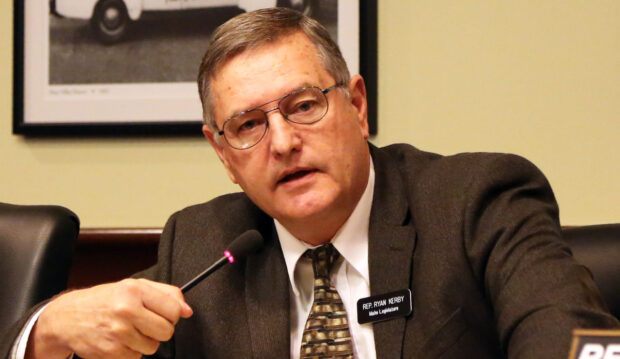The House Education Committee killed one of the first proposed new education bills of the session Wednesday. At issue was draft legislation state officials said was designed to clear up confusion over teacher evaluations.
Committee members voted 11-4 against introducing the bill.
It is highly unusual, although not unprecedented, for House Education to kill a nonpartisan bill brought by the State Board of Education during an introductory print hearing.
House Education Committee Chairwoman Julie VanOrden, R-Pingree, opened Wednesday’s meeting by calling for only a brief overview of the five bills up for introduction. That way, VanOrden said, the committee could efficiently introduce the bills, and then hold a detailed hearing and vetting of each specific bill at a later date.
That’s not what happened.
Following a round of probing questions, only Vice Chairman Patrick McDonald, R-Boise, and Reps. Paul Amador, R- Coeur d’Alene, and Gayann DeMordaunt, R-Eagle, joined VanOrden in voting to introduce the bill. The committee’s three Democrats joined the remaining eight Republicans in opposing the bill — first uttering a loud chorus of “nays” during a voice vote, then voting one-by-one to kill it.
Officials with the State Board of Education brought the proposed bill, saying annual reviews of teacher evaluation data and documents revealed discrepancies in how school districts maintain the files associated with teacher evaluations.
“In some cases, the school district didn’t fully understand what that requirement was,” said Tracie Bent, the State Board’s chief planning and policy officer.
The one-page bill would have added one sentence to existing law: “Relevant material shall include such documents necessary to provide evidence of meeting the evaluation requirements established in the state evaluation framework.”
Teacher evaluations in Idaho are increasingly important, and controversial. In 2015, the Legislature tied a teacher’s ability to earn a raise through the career ladder salary law to performance on evaluations.
State law already requires that each teacher receive an evaluation, and that evaluation must include two documented classroom observations.
But the State Board’s reviews and Idaho Education News’ independent investigations have found there is disagreement — sometimes significant disagreement — over what must be included in evaluation files.
During last year’s legislative session, State Board officials told members of the Legislature’s education committees that 36 percent of teacher evaluations screened during an annual review did not meet minimum standards required in Idaho law.
In December 2016, Idaho EdNews documented confusion and disagreement over evaluation practices. Mountain Home Superintendent James Gilbert told Idaho EdNews that his district destroys teacher evaluation documents as soon as the signed evaluations are complete.
Meanwhile, the State Department of Education’s spokesman at the time, Jeff Church, told Idaho EdNews that districts were asked to submit observation documents to the state for a review, and that doing so was not optional.
Gilbert responded by saying that he could not submit records that don’t exist, and that the state’s request for documents was so vague as to be meaningless.
“That is something they needed to clarify for anybody to submit anything,” Gilbert said at the time.

On Wednesday, Rep. Ryan Kerby, R-New Plymouth, led opposition to introducing the new evaluations bill. Kerby told Bent that he wanted her to explain how the proposed new bill would improve student learning.
“Are our kids going to really learn more by piling more administration on the schools?” Kerby asked.
Kerby himself is no stranger to the evaluations controversy.
In 2017, a state agency called the Professional Standards Commission and a hearing panel of his peers ordered that an official letter of reprimand be placed in Kerby’s personnel file for submitting incomplete teacher evaluations.
The PSC and the review panel found that Kerby violated state law and his code of ethics by not factoring student achievement into teacher evaluations — as required by law —when he served as New Plymouth’s school superintendent.
Kerby and the SDE also butted heads in 2016, when Kerby argued forcibly in an Idaho EdNews opinion piece that the state did not request documented classroom observations be included in evaluations reports.
Church and a representative of the Boise School District said the state did request those documents.
During Wednesday’s vote, four House Education Committee members who either do serve or have served as teachers voted against introducing the new evaluations bill. The list includes Kerby, Rep. Dorothy Moon, R-Challis, Rep. John McCrostie, D-Garden City, and Rep. Sally Toone, D-Gooding.
Interviewed after their votes, McCrostie and Toone said they are comfortable with the consistency and validity of Idaho’s teacher evaluation system and were worried that the new bill would have required things such as confidential notes between an administrator and teacher be included in the evaluations files. Both also said they don’t like a one-size-fits-all approach to evaluations.
“Now we’ve got to trust people to do it among our school districts,” Toone said. “We need to keep the focus on students.”
House Education’s vote means the proposed bill is dead for the session, and the forceful way legislators killed the bill suggests there is little interest in taking the issue on.
